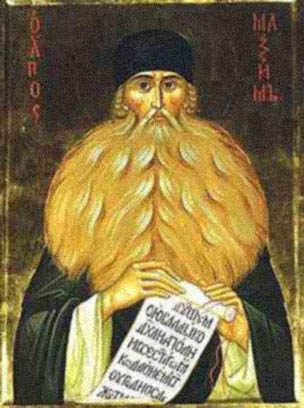
The Monk Maxim the Greek
Commemorated on January 21
The Monk Maxim the
Greek (XV-XVI Centuries), was the son of a rich Greek dignitary in the city
of Arta (Albania), and he received a splendid education. In his youth he
travelled widely and he studied the languages and sciences (i.e. intellectual
disciplines) in the European lands – he spent time at Paris, Florence, Venice.
Upon returning to his native land, he went to Athos and accepted monasticism at
the Batopedeia monastery. And with enthusiasm he studied ancient manuscripts,
left on Athos by monasticised Byzantine Greek emperors (Andronikos Paleologos
and Ioannes Kantakuzenos). During this period the Moscow Greatprince Vasilii
Ioannovich (1505-1533) wanted to have insights into the Greek manuscripts and
books of his mother, Sophia Paleologa, and he recoursed to the Constantinople
patriarch with a request to send him a learned Greek. The Monk Maxim received
the commission to go to Moscow. Upon his arrival, he was entrusted to render
into Slavonic translation a Commentary on the Psalter, and somewhat later a
Commentary on the Book of the Acts of the Apostles, and also certain other
Divine-service books.
The Monk Maxim tried
zealously and accurately to fulfill everything entrusted to him. But in view
that Slavonic was not his native language as a translator, there essentially
arose certain imprecisions in the translations.
The Metropolitan of
Moscow Varlaam highly valued the work of the Monk Maxim. But when the Moscow
throne came to be occupied by metropolitan Daniel, the situation changed.

The new metropolitan
demanded that the Monk Maxim translate into the Slavonic language the Church
history of Theodorit. Maxim the Greek resolutely refused this commission,
pointing out that "in this history are included letters of the heretic
Arius, and this might present danger for the semi-literate". This refusal
caused a rift between the monk and the metropolitan. Despite their differences,
the Monk Maxim continued zealously to toil in the field of the spiritual
enlightenment of Rus'. He wrote letters against the Mahometans, Papism and the
pagans. He translated the Commentaries of Saint John Chrysostom on the Gospels
from Matthew to John, and likewise he wrote several works of his own.
When the Greatprince
set out to dissolve his marriage with his spouse Solomonia because of her
infertility, the dauntless confessor Maxim sent the prince his "Chapters
Instructive towards Initiating Right-Belief", in which he persuasively
pointed out, that the situation obliged the prince not to yield to beast-like
passions. For this they locked up the Monk Maxim in prison. And from this
moment there began a new period in the life of the monk, filled with much
suffering. Inaccuracies found in his translations were imputed to the Monk
Maxim as deliberate and intentional corruptions of the text. It was difficult
for the monk in prison, but amidst his sufferings the saint gained also the
great mercy of God. An Angel appeared to him and said: "Endure, elder!
These torments deliver thee of torments eternal". In prison the monastic
starets (elder) wrote in charcoal upon a wall a Canon to the Holy Spirit, which
even at present is read in the Church: "Wherefore with manna having
sustained Israel in the wilderness of old, and my soul, O Lord-Vladyka, is
filled of the All-Holy Spirit, through Which vouchsafe that I shalt serve Thee
always..."
After six years the
Monk Maxim was set free from prison and sent off under church interdict to
Tver. There he lived under the supervision of the good-natured bishop Akakii,
who dealt kindly with guiltless sufferer. The monk then wrote his
autobiographical work: "Thoughts, by which a Monk in Woe and Imprisoned,
did Console and Strengthen himself with Patience". Here are some several
words from this vivid text: "Neither grieve, nor sorrow, nor be saddened,
beloved soul, of this, that thou hast suffered unjustly, from which it becometh
thee to accept all to benefit, and wherefore thou employ it spiritually,
proffering it as sustenance, filled of the Holy Spirit..." Only after
twenty years of dwelling at Tver did they decide to let the monk live freely,
and remove from him the church interdict. The Monk Maxim the Greek spent the
final years of his life at the Trinity Sergiev Lavra. He was already about 70
years of age. Oppression and work took their toil on the health of the monk,
but his spirits remains vigorous, and he continued on at his work. Together
with his cell-attendant and student Nil, the monk with zeal translated the
Psalter from Greek into the Slavonic language. Neither oppression nor prison
discouraged the Monk Maxim.
The Monk Maxim
reposed on 21 January 1556. He was buried at the northwest wall of the Spirit
church of the Trinity Sergiev Lavra. Graced manifestations were to no little
extent witnessed at the grave of the Monk Maxim, and a tropar and kondak to him
was compiled. The image of the Monk Maxim is often depicted on the icon of the
Sobor (Assemblage) of Radonezh Saints.
© 1996-2001 by translator Fr. S. Janos.